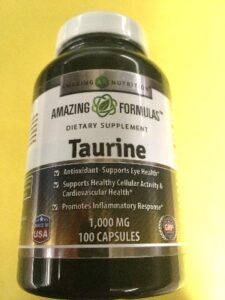-
Adopt
-
Veterinary Care
Services
Client Information
- What to Expect – Angell Boston
- Client Rights and Responsibilities
- Payments / Financial Assistance
- Pharmacy
- Client Policies
- Our Doctors
- Grief Support / Counseling
- Directions and Parking
- Helpful “How-to” Pet Care
Online Payments
Referrals
- Referral Forms/Contact
- Direct Connect
- Referring Veterinarian Portal
- Clinical Articles
- Partners in Care Newsletter
CE, Internships & Alumni Info
CE Seminar Schedule
Emergency: Boston
Emergency: Waltham
Poison Control Hotline
-
Programs & Resources
- Careers
-
Donate Now
 By Megan Whelan, DVM, DACVECC, CVA
By Megan Whelan, DVM, DACVECC, CVA
angell.org/emergency
emergency@angell.org
617-522-7282
January 2019
The cardiac disease dilated cardiomyopathy (DCM) has been genetically linked to certain dog breeds and can also be seen post doxorubicin administration. At Angell Animal Medical Center (AAMC) we have been diagnosing an increasing number of dogs with DCM and have been wondering why this is the case.
In 1987, Pion et al.’s article on, “Myocardial failure in cats associated with low plasma taurine: a reversible cardiomyopathy” was published in Science. The authors reported the discovery that taurine deficiency in cats can cause DCM.1 Subsequent articles by many of the same authors investigated the supplementation of taurine in these cats.2 Cats are obligate carnivores and cannot make taurine, so the amino acid is considered essential. Unlike cats, dogs can make taurine from other dietary amino acids and therefore don’t have to rely on diet.
Especially noteworthy is that the breeds we have recently been diagnosing with DCM are not the breeds known to have a genetic predisposition (Dobermans, Boxers, and American Cocker Spaniels). We are seeing DCM in “atypical” breeds like Boston Terriers etc., and the commonality amongst these patients is that they are being fed a grain free or homemade diet. Some recent cases diagnosed at AAMC include a dog being fed a vegetarian diet his whole life that was high in lentils and a dog on a strictly vegan diet. Both dogs developed taurine deficiency and DCM. The grain free diets have become very popular in recent years, so perhaps it is the formulations that are causing the issue. An article by Ko et al. tested whether or not rice bran or other fibers including beet pulp affected bile acid excretion. They did not find evidence that rice bran was causing low taurine levels in large dogs being fed lamb and rice diets, however they reported that beet pulp may have lowered the whole body taurine in dogs by increasing excretion of fecal bile acids and decreasing protein digestibility. This would decrease the availability of sulfur amino acids which are precursors for taurine.3 In addition, we have diagnosed 5 cats within a 6 month period with DCM that had been eating grain free/boutique diets and had confirmed low taurine levels.
In a recent online article,4 Dr. Lisa Freeman, a nutritionist at Tufts University Cummings School of Veterinary Medicine, said in regards to DCM in non-taurine deficient dogs, “What seems to be consistent is that it does appear to be more likely to occur in dogs eating boutique, grain-free or exotic ingredients diets.” Exotic ingredients include novel proteins (venison, buffalo, kangaroo) and legumes like lentils, chickpeas etc. Dr. Freeman calls them Boutique Exotic Ingredients (BEG) and more information can be found in her article at the following link http://vetnutrition.tufts.edu/2018/06/a-broken-heart-risk-of-heart-disease-in-boutique-or-grain-free-diets-and-exotic-ingredients
The best way to determine if a pet has taurine deficiency is to run a whole blood taurine level. Plasma levels can reflect acute changes, therefore whole blood levels will be more accurate in determining the whole body taurine level. For DCM in cats the recommended supplementation taurine dose is 250 mg PO SID to BID. For DCM in dogs under 25 kg the dose is 500-1000 mg taurine PO BID to TID. For dogs over 25 kg, 1-2 grams taurine PO BID or TID.5
A whole blood taurine level costs about $200.00 at Wisconsin Veterinary Diagnostic Lab. Samples should be shipped in heparin (green top tube) and the test results take about 5-7 days to return. The reference range for whole blood normal taurine levels in dogs at this lab is 200-350 nmol/mL, with a critical level of <150 nmol/mL.
Supplemental taurine is easy to obtain at local drug stores or nutrition stores. It comes in many different formulations including chewable tablets, capsules (250 mg, 500 mg, 1000 mg), liquid, and powder. Amazon.com sells a 100 count bottle of 1000mg taurine capsules for approximately $20.
Currently there are no published studies confirming a link between boutique/grain free diets and DCM, but several studies are underway. Dr. Joshua Stern, a cardiologist from UC Davis is conducting research on Golden Retrievers with DCM and taurine deficiency.
Not all pets diagnosed with DCM while being fed a grain free or limited ingredient diet respond to taurine supplementation, but some certainly do. The AAMC Cardiology service recommends starting taurine supplementation and switching to a more balanced diet if the patient is not on their current special diet for a medical reason. In addition, a recheck whole blood taurine level and echocardiogram should be performed 3 months after supplementation is started.
This article is not to suggest that all boutique diets will cause harm. However, feeding a diet developed by a company using evidence-based nutritional research who can guarantee the contents of their product is recommended. Many small, specialty, boutique companies are unable to make these claims. Reporting cases of DCM suspected to be a result of diet to the FDA will help further elucidate the problem. At this time it is not certain why these dogs have DCM, most cases are not taurine deficient, and not all are being fed a grain free diet.
References:
- Pion et al. Myocardial failure in cats associated with low plasma taurine: a reversible cardiomyopathy. Science 1987; 237:764-768.
- Pion et al. Response of cats with dilated cardiomyopathy to taurine supplementation. J Am Vet Med Assoc 201(2) 275-284, 1992.
- Ko et al. Dietary beet pulp decreases taurine status in dogs fed low protein diet. J Anim Sci Technol 58(29).
- A broken heart: risk of heart disease in boutique or grain-free diets and exotic ingredients. Online article at vetnutrition.tufts.edu by Dr. Lisa Freeman June 4, 2018.
- Plumb’s veterinary drug handbook 7 th edition. Ames, Iowa: Wiley-Blackwell; 2011pp. 958-959.